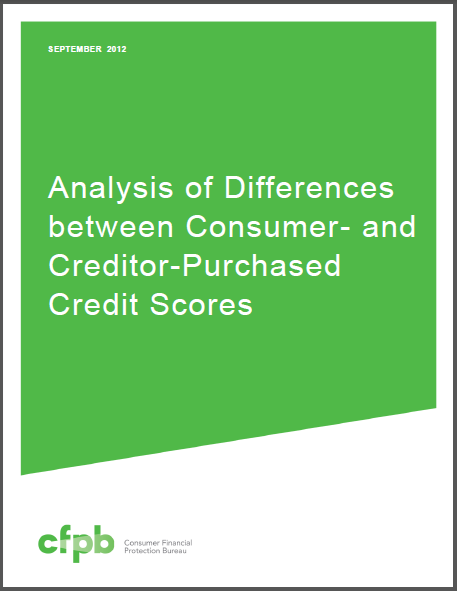 The Consumer Financial Protection Bureau (CFPB) has just issued its latest report to Congress on credit scores sold to consumers versus credit scores sold to creditors.
The Consumer Financial Protection Bureau (CFPB) has just issued its latest report to Congress on credit scores sold to consumers versus credit scores sold to creditors.
The 42-page report, which you can find here, provides an analysis of different scoring models, comparing credit scores sold to creditors and those sold to consumers by the national credit reporting agencies, including Experian.
Of particular interest, and of reassurance to consumers, are some high-level conclusions from the report:
- “The CFPB found that for a majority of consumers the scores produced by different scoring models provided similar information about the relative creditworthiness of the consumers. That is, if a consumer had a good score from one scoring model the consumer likely had a good score on another model. For a substantial minority, however, different scoring models gave meaningfully different results.”
- “Correlations across the results of scoring models were high, generally over .90 (out of a possible one). Correlations were stronger among the models for consumers with scores below the median than for consumers with scores above the median.”
There are many details in the report, but Stuart Pratt, president and CEO of the Consumer Data Industry Association, provides a thoughtful analysis of the report in the CDIA’s public response:
We applaud the Consumer Financial Protection Bureau’s credit score report that was released today. We think it puts an end to the debate over the value of educational scores versus those scores lenders use.
The CFPB study concluded that ‘correlations across the results of the scoring models were high.’ As a result, it determined ‘that for a majority of consumers the scores produced by different scoring models provided similar information about the relative creditworthiness of the consumers. The study found that different scoring models would place consumers in the same credit-quality category 73-80% of the time.
The study sheds new light on why consumers can trust the credit score disclosures they receive and the products in the commercial marketplace that help consumers build a deeper understanding of their credit scores and how they affect their financial decisions.
Consumers want to be proactive in learning about their scores. Unfortunately, too many mixed messages have made them hesitant to access the data currently available that will help them better understand the scoring process.
This study is good news for consumers who can now be confident that the disclosures and services they are getting today are helping to empower them to receive better prices tomorrow in the credit market, according to Pratt.
The study was built on the foundation of two key facts made clear in the Bureau’s 2011 report and reiterated again in this study:
- Given this complexity it is unlikely that a consumer will often be able to know the exact score that a particular lender will use to evaluate them.
- Lenders use credit scores produced by many different scoring models.
The CFPB is right. No one score is used by all lenders. However, the credit score is a valuable educational tool and can enable consumers to better understand their creditworthiness relative to other consumers. As the CFPB’s report notes, the many credit score options in the marketplace today will help consumers answer these questions, Pratt concluded.
In its announcement, the CFPB also made two recommendations to consumers, which reflect what Experian frequently advocates to consumers who are working to improve their credit history and credit scores:
Shop around for credit.
Consumers benefit by shopping for credit. Regardless of the scores different lenders use, they may offer different loan terms because they operate different risk models or face different competitive pressures.Consumers should not rule out of seeking lower priced credit because of assumptions they make about their credit score. While some consumers are reluctant to shop for credit out of fear that they will harm their credit score, that negative impact may be overblown. Inquiries generally do not result in a large reduction in a consumer credit score.
Check the credit report for accuracy and dispute errors.
Credit scores are calculated based on information in a consumer’s credit file. Inaccurate information may be the difference between a consumer being approved or denied a loan. Before shopping for major credit items, the Bureau recommends that consumers review their credit files for inaccuracies. Each of the nationwide credit bureaus is required by law to provide credit reports for free to consumers who request them once every 12 months.